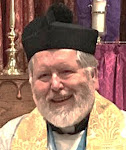Michael Ramsey (1904-1988) was Archbishop of Canterbury from 1961 to 1974. His books always take the reader on a spiritual journey, and it’s a pity that many of them are now out of print. As an academic, priest, bishop, and spiritual guide, Ramsey was a giant. Here are two passages of his teaching - VERY suitable for Advent reading! - on pride and humility:
From Introducing the Christian Faith (1961):
To be a Christian is to be very closely united to Christ as living Lord, not alone, but in the fellowship of the Church. It means an existence in which our self-centredness is constantly challenged and defeated. The more Christ becomes your true centre, the less can your own selfish pride be the centre. The more you are drawn into the fellowship of those who belong to Christ, the less are you entangled by your selfish pride.
That is why again and again the Christian life has been called a “death to self”; it is the growth in us of Christ’s own self-giving unto death. The sacraments depict this: Baptism was from the beginning the means whereby the convert died to the old life whose centre was the self, having been buried symbolically beneath the water, he stepped out into a new life whose centre was Christ in the midst of the Church’s fellowship. Holy Communion deepens our unity with Christ who, through the media of bread and wine, feeds us with himself. But it is always his self as given to death. It is his broken body, his blood poured and offered.
These are the great realities upon which Christian people have laid hold. Some have grasped them once, and forgotten them. Some have grasped them only in a conventional and unreal way. Some have grasped them, and courageously try to be true to them among much conflict with the reassertions of self and pride. Some have grasped them, and have shown it in lives in which, notwithstanding some humiliating failures, Christ really has been apparent.
It all happens through Calvary judging us, Calvary bringing forgiveness to us, and Calvary defeating the pride which rules us.
From The Christian Priest Today (1972):
Let the griefs, pains and humiliations that come to you help you. You will hate them, as they always hurt. But they help you to be near to Christ, and you will be learning not to fear them. There is the pain of disappointment when some cherished plan has gone wrong, and you are inclined to be bitter and resentful: but let it help you to think more about Christ‘s pain and disappointment; then you are nearer to him and it becomes very different. There is the pain sometimes of opposition, or of misunderstanding, or even abuse perhaps, coming to you from other people: it can feel terrible, but again it can bring you near to Christ. What if it is a part of the discipline of Christ, which we profess to believe in?
There is also the pain that comes from our own mistakes coming home to roost. But that too can bring us back to the truth of our own inadequacies, and the greatness of Christ’s forgiveness, to the decrease of self and the increase of him. These things are not things that we do or seek: they just come. They will come to you too. When they come, let them help you to be a little nearer Christ crucified; that is how we find the deep joy of priesthood and Christian life. You will come to know how truly the psalmist says: ‘Thou of very faithfulness hast caused me to be troubled’ (Psalm 119:75). Be ready to accept humiliations: they can hurt terribly, but they help you to be humble, and to be a little nearer to our humble and crucified Lord. There is nothing to fear if you are near to our Lord and in his hands.



















0 comments:
Post a Comment